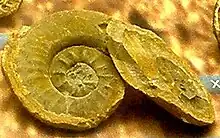| Xenodiscus Temporal range: | |
|---|---|
 | |
| Scientific classification | |
| Domain: | Eukaryota |
| Kingdom: | Animalia |
| Phylum: | Mollusca |
| Class: | Cephalopoda |
| Subclass: | †Ammonoidea |
| Order: | †Ceratitida |
| Family: | †Xenodiscidae |
| Genus: | †Xenodiscus Waagen, 1879 |
Xenodiscus is an extinct genus of ammonoid cephalopod and one of the earliest known ceratites, found in the Upper Permian of northern India and Timor. Xenodiscus is included in the family Xenodiscidae which is part of the ceratite superfamily Xenodiscaceae.[1]
Diagnosis
Xenodiscus has a thinly discoidal and ribbed shell with ceratitic sutures, coiled so all whorls are exposed. The whorl section is subquadrate and compressed, so as to be narrower than high.
References
- ↑ Arkell, W.J.; Furnish, W. M.; Kummel, B.; Miller, A. K.; Moore, R. C.; Schindewolf, O. H.; Sylvester-Bradley, P. C.; Wright, C. W. (1957). "Part L—Mollusca 4, Cephalopoda, Ammonoidea". In R.C. Moore (ed.). Treatise on Invertebrate Paleontology. Geological Society and University of Kansas Press. ISBN 0-8137-3012-0.
This article is issued from Wikipedia. The text is licensed under Creative Commons - Attribution - Sharealike. Additional terms may apply for the media files.